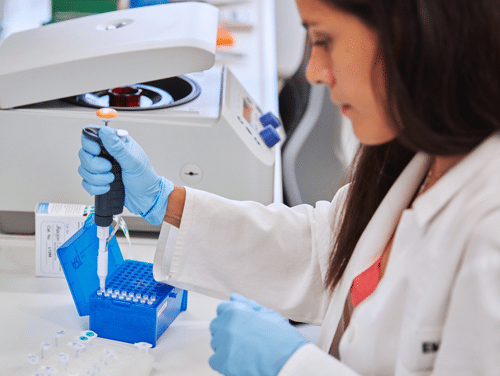
To perform fundamental research in molecular biology
EMBL has developed an integrative, interdisciplinary structure to study and understand biological phenomena in their full complexity
EMBL was set up to promote molecular biology across Europe, and to create a centre of excellence for training Europe's leading young molecular biologists. To accomplish this, EMBL pursues five missions.
The aim of EMBL's research is to achieve a fundamental understanding of biological processes. We need to study and understand biological phenomena and systems in their full complexity. EMBL has developed an integrative, interdisciplinary structure that is ideally suited to tackling this challenge.
The most widely used services provided by EMBL are the biological databases built and hosted at EMBL’s European Bioinformatics Institute in the UK. Several million users around the world consult these databases each year. At two of its sites, Hamburg and Grenoble, EMBL provides hundreds of users each year with access to world-leading sources of X-ray and neutron radiation, enabling them to carry out research in structural biology. EMBL Heidelberg’s core facilities provide scientists with access to advanced technologies in light microscopy, electron microscopy, chemical biology, flow cytometry, genomics, metabolomics, protein expression and purification, and proteomics. EMBL Rome hosts additional facilities in flow cytometry, gene editing and virus, and light imaging. The Mesoscopic Imaging Facility at EMBL Barcelona enables 3D imaging of samples over time, allowing scientists to study biological systems at the scale of tissues and organs.
EMBL's multifaceted training programme includes:
EMBL, often in collaboration with its sister organisation EMBO, organises multiple training courses, workshops, and symposia each year. Alongside training for scientists, EMBL’s education facility ELLS offers courses for science teachers and school pupils, and EMBL’s Science and Society programme promotes public engagement with the life sciences.
The development of new instruments and technologies has a long history at EMBL. Some of the first experiments carried out here involved the use of radiation from a synchrotron source to study biological material ─ now a vital part of X-ray crystallography. Other areas of instrument development include DNA sequencing, cell fractionation, light and electron microscopy methods, mass spectrometry of proteins, X-ray imaging plates, synchrotron beamlines and automated cell micro-injectors. An area of prolific activity is the development of software and databases for the life sciences.
EMBL is also actively engaged in developing its discoveries to benefit society. EMBL’s technology transfer partner, EMBLEM, identifies, protects, and commercialises the intellectual property developed at EMBL, as well as by EMBL alumni and third parties. EMBLEM accelerates the transfer of innovative technologies from fundamental research to industry by working closely with industrial partners to develop new diagnostic methods, drugs, therapies, machines, and devices.
Internationality and collaboration are vital aspects of EMBL research, and EMBL works to establish links and initiate collaborative projects between scientists in Europe and the wider world. EMBL’s International Relations team is actively involved in discussions around European science policy, and promotes relationships between EMBL and institutions in the EMBL member states, including EMBL’s successful network of partnerships. Another of EMBL’s successes is the establishment of Euro-BioImaging: a Europe-wide research infrastructure that enables life scientists to access the latest technologies and resources in biological and biomedical imaging.
News from EMBL’s six sites